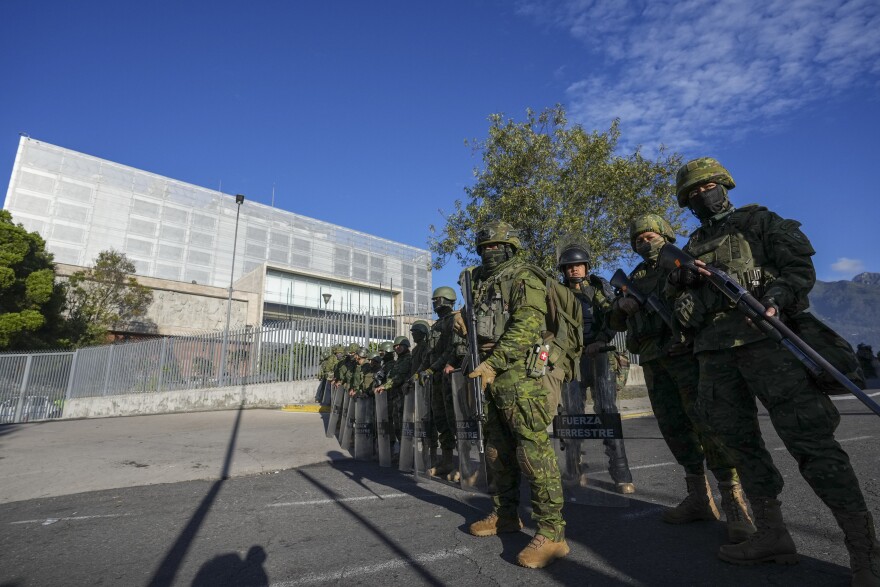The president of Ecuador dismissed the legislature Wednesday in a move that promised more turmoil around a conservative leader unable to enact his agenda aimed at widening business opportunities and attracting more investment.
As the constitution requires, heavily armed soldiers surrounded the National Assembly after the move by President Guillermo Lasso, who has been locked in showdown with legislators' who want to impeach him. Lawmakers have accused Lasso of deliberately allowing a corrupt deal between the state-owned oil transport company and a private tanker company, accusations he denies.
Ecuador’s top military leader warned that the armed forces would act “firmly” against any violence.
Lasso appeared to have the support of the armed forces but opposition from Indigenous Ecuadorians. Protests by the powerful Confederation of Indigenous Nationalities have nearly paralyzed the country in recent years, and the group's leader appeared outraged.
Lasso “launched a cowardly self-coup with the help of the police and the armed forces, without citizen support,” Leonidas Iza Salazar said.
Lasso can now govern for up to six months by decree under the oversight of Ecuador’s top court.
In a televised message, Lasso accused the National Assembly of focusing “on destabilizing the government.” He called his move “democratic” and described it as a way to give Ecuadorians “the power to decide their future in the next elections.”
“This is the best possible decision,” he said.
Lawmakers had accused Lasso of not having intervened to end a contract between the state-owned oil transport company and a private tanker company. They argued Lasso knew the contract was full of irregularities and would cost the state millions in losses, something he has rejected as untrue.
Called the “crossed death” because it cuts short the mandate of both the assembly and the president, the option to disband the congress and temporarily rule by decree was established in Ecuador's constitution in 2008 as a means of avoiding protracted periods of political paralysis.
After Lasso announced his decision Wednesday, the head of the Joint Command of the Armed Forces, Gen. Nelson Proaño, called on Ecuadorians to maintain respect for the law and warned against rupturing the constitutional order through violence.
If violence erupts, the armed forces and police “will act firmly,” he said.
In neighboring Peru, conflicts between the opposition-led legislature and president also led to attempts to oust each other last year. Then-President Pedro Castillo tried to dissolve Congress and head off his own impeachment in December, but lawmakers quickly voted him out of power and law enforcement arrested him, which resulted in months of deadly protests carried out for the most part by Indigenous peoples and peasants.
The National Electoral Council now has seven days to call presidential and legislative elections, which must be held within 90 days. Those elected will finish the terms of Lasso and the lawmakers he ousted, which had been set to end in May 2025. Lasso can choose to run in the election.
Lasso, a former banker, was elected in 2021 and has clashed from the start with a strong opposition in the 137-member National Assembly. He defended himself before Congress on Tuesday, insisting there was no proof or testimony of wrongdoing.
Lasso’s governing powers are now limited. Constitutional attorney Ismael Quintana explained that the president can only address economic and administrative matters, and the Constitutional Court will have to approve his decisions.
Will Freeman, fellow for Latin America studies at the Council on Foreign Relations, said mass protests are likely in the coming days.
“It’s also hard to imagine Lasso is making this move without the tacit support of top brass in the military,” he said. “In the past, protests have tended to turn destructive quickly — and security forces have also cracked down.”
___
Associated Press writer Regina Garcia Cano reported from Mexico City.





